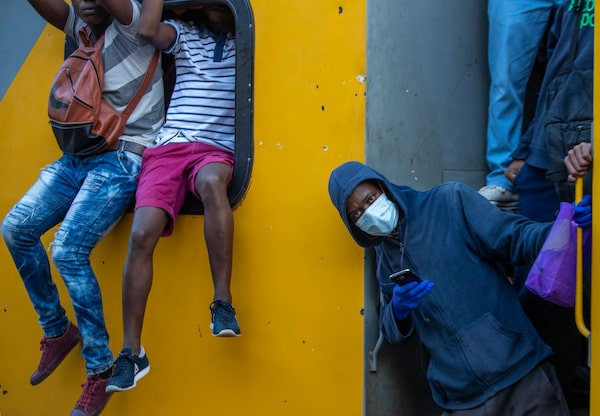
Train commuters hold on to the side of an overcrowded passenger train in Soweto, South Africa, on Monday.Themba Hadebe/The Associated Press
A traveller from Canada is among the early confirmed cases of the coronavirus in South Africa, illustrating the global connections that are beginning to trigger travel bans and flight shutdowns in even the most geographically remote corners of the African continent.
The case imported from Canada was among dozens of new cases announced across Africa on Monday, including the first reported cases in Somalia, Benin, Liberia and Tanzania.
The virus has now been confirmed in 30 of the 54 countries on the continent. Over the weekend, cases were reported for the first time in several of Africa’s smallest countries, including Namibia, Seychelles, Mauritania, Equatorial Guinea and the kingdom of eSwatini (formerly known as Swaziland). In total, nearly 400 people have been infected in confirmed cases so far.
A wave of border closings and travel shutdowns have been imposed across Africa in the past two days, from large countries such as South Africa – which has banned the entry of citizens from eight “high-risk” countries including the United States, Italy and China – to smaller countries such as Somalia, which announced on Monday that it is suspending all commercial flights into the country for the next 15 days.
While most cases so far have been imported from abroad, there are signs that local community transmission is already underway in several African countries. South African President Cyril Ramaphosa, in a speech broadcast on Sunday night, said the country is “now dealing with internal transmission of the virus.” Authorities said two cases of internal transmission are awaiting verification.
South Africa has 62 confirmed cases so far, almost all of which were linked to travellers arriving from Europe or North America. No details were given of the case that originated in Canada, except that it involved a 39-year-old man in Western Cape province who had recently travelled to Canada. His nationality was not disclosed.
In Rwanda, seven cases have been confirmed in recent days. One of the cases was a Rwandan without any travel history, implying that he had been infected locally.
Egypt, with 150 confirmed cases, has reported far more cases than any other African country, and experts believe it has had many cases of community transmission. The true number of cases in Egypt is probably in the thousands, according to a research team at the University of Toronto.
In many African countries, testing for the virus has been limited because of a shortage of testing kits. Testing has focused largely on those who fall sick after travelling to Europe or other high-risk regions.
Chinese billionaire Jack Ma, co-founder of the Alibaba technology group, announced on Monday that his charitable foundation is donating a total of 1.1 million testing kits and six million masks to African countries. “Africa can be one step ahead of the coronavirus,” he tweeted.
Ethiopian Prime Minister Abiy Ahmed will manage the distribution of the masks and testing kits to each African country, he said.
In South Africa, the first coronavirus case was not reported until March 5. But since late last week, the number of cases has been doubling every two days. Health Minister Zweli Mkhize said on Monday that the growth has been “explosive.”
Mr. Ramaphosa declared a national state of disaster on Sunday night, banning all gatherings of more than 100 people, shutting down schools for a month and calling for a halt to non-essential travel.
His officials announced on Monday they had cancelled nearly 10,000 entry visas that had been granted to Chinese and Iranian citizens this year, since both China and Iran are considered “high-risk” countries.
If the crisis grows worse, Mr. Mkhize said, the government could impose a national state of emergency, requiring lockdowns on non-essential movement, similar to those in Italy and China.
But in South Africa, as in most other African countries, a lockdown could be difficult to impose because a large percentage of the population lives in informal housing or in overcrowded conditions with large extended families. Transport is usually in crowded mini-bus taxis, where the virus can easily spread.
Mr. Ramaphosa, speaking to reporters on Monday, said the danger of virus transmission in informal shack settlements and mini-buses is “one of our greatest concerns.”
As a result of apartheid, he said, South Africa has a legacy of spatial apartheid, in which most residential areas are far away from workplaces, requiring long commutes in crowded transport after queuing in busy taxi ranks. Several million South Africans are transported by the taxi industry daily.
The government announced on Monday that it will mount “an aggressive information drive,” along with random testing and sanitation measures, to try to reduce risks in taxis and trains.
If quarantine orders are imposed, the government would have to set up quarantine facilities, since self-isolation would be impossible for many South Africans in crowded housing.
“When this outbreak starts affecting our poor communities, where families do not have enough rooms or space to quarantine those affected, we will experience a crisis,” Mr. Mkhize told reporters.
 Geoffrey York
Geoffrey York